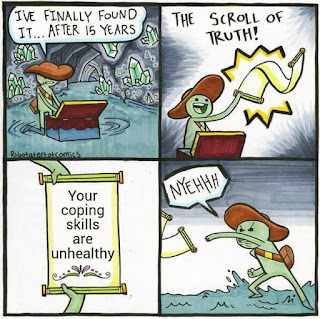Coping strategies
A few years ago as an undergraduate I was assigned a research task on coping strategies that people employ under stress. I think most of the below came from Carver & Connor-Smith (2010), but I haven't re-read it just for this blog post! I remember that coping strategies fall broadly into two categories:
PROBLEM FOCUSED COPING
which encompasses strategies aimed at removing the stressor
and
EMOTION FOCUSED COPING
which encompasses strategies aimed at minimising distress caused by the stressor
At the time of researching the paper, I remember poo-pooing the emotion-focused approaches, with a feeling of superiority that I was brave enough to actually jump in and sort things out. I described emotion-focused coping as 'a form of symptom relief' - the underlying sentiment being that it isn't really dealing with the actual problem.
Today, as I've tried to process a situation that I am finding difficult, I told myself: 'Don't think about what's actually happened, just focus on processing the emotions you're feeling; that way when you next have to face this issue, it will be less emotionally loaded and easier to deal with.' It led me to reflect on how much my coping strategies have changed over the last few years. There are probably a few reasons for this:
- I've learnt to recognise that in certain situations, the problem is not in the world but in me. This can be true, for instance, when you're dealing with a conflict of personality. It's easy to feel that the answer is to tell the other person where they're going wrong, so that they can change the way they are. That''s not very nice for the other person! But rubbing up against other people is also the ideal way to find out our own faults. Proverbs 27v17 puts it this way: 'As iron sharpens iron, so one person sharpens another.' I find that if I work through what I'm feeling about a situation, it will usually highlight something that needs to change in my own perspective; and that change of perspective often makes the problem disappear.
- I've learnt that even when I know how to deal with a situation, I still have emotional responses to process. Often once a problem is resolved, or I have figured out a solution to it that is in the process of being implemented, I find that the stress it's caused is still there. That's when time out or a chat with a mentor will bring me back to a place of peace.
- I've learnt that when I have processed my own emotions, I am better placed to see the practical solutions. Emotions have an unhelpful way of clouding your judgment; Spock argues that, because of this, we should avoid emotions altogether. In my experience, that leads to a different sort of problem. Instead, recognising your emotions and giving them time to resolve can lead to better decision making and more effective problem-focused coping strategies. Often before a difficult meeting with a client, I take time to relax or pray rather than thinking about what I need to say to them. Then, as I speak to them, I find myself more able to think on the spot and more open to creative suggestions.
- Most importantly, I'm learning that most important things in life are outside my control. Maybe I should have realised this sooner! There is a lot we can do, as individuals, to make the world a better place and to reach our own life goals, and I will never be an advocate for not trying. But there are times we will mess up, and there are things we simply don't have the power to change, like in the Alzheimer's example above. As a 'do-er' by nature, I find that hard to stomach, but I'm learning to balance investing my best in resolving a problem without carrying the burden of responsibility if it doesn't work out.


I find breathing helps :)
ReplyDeleteMore seriously, it probably depends on what the problem is, and I tend to find that I'm less able to cope with something stressful if there are other stressful things going on too. So sometimes writing a list of what I feel stressed by helps, as it helps me identify what's going on. Sometimes cleaning the kitchen helps. Sometimes writing a list of what needs doing so I can prioritise my tasks helps. Most times pausing to pray helps. Sometimes the most helpful thing is to sit down with a cuppa, sometimes it's to stand up and do something. And a final thought, I find being able to recognise emotions/stress before it materialises is really helpful.
M :)